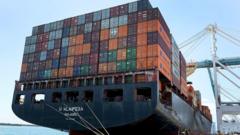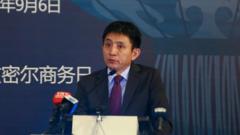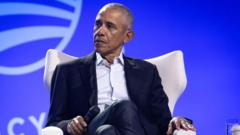President Trump's recently threatened tariffs on China have sparked a strong response from Beijing, stating it would fight back if the U.S. escalates its sanctions. With potential tariffs reaching extremes, both nations stand at a crossroads in their trade relations.
China Responds Forcefully to Trump’s Tariff Threats

China Responds Forcefully to Trump’s Tariff Threats
As tensions escalate, China labels President Trump's tariff threats "blackmail," vowing to retaliate if further actions are taken.
China has voiced strong opposition to U.S. President Donald Trump's latest tariff threats, which could impose an additional 50 percent levy on Chinese imports. The Ministry of Commerce condemned the threats as "blackmail," insisting that such a course of action would only exacerbate tensions between the two economic superpowers.
In a statement issued on Tuesday, the ministry did not mention Trump by name but acknowledged the U.S. plan for further tariffs. They asserted that China would implement countermeasures to protect its national interests. "The U.S. threat to escalate tariffs on China is a mistake on top of a mistake," the ministry declared, reinforcing China's determination to stand firm against U.S. demands. "If the United States insists on its own way, China will fight to the end."
The current tariff landscape has been intensified by recent announcements from China, which revealed a matching retaliatory tax of 34 percent on American imports. Should Trump’s proposed escalations occur, tariffs on certain Chinese goods could exceed 104 percent due to pre-existing levies from earlier years. The implications for U.S. importers of various products, such as electronics and machinery, could be substantial.
Moreover, China urged a reevaluation of U.S. tariffs, calling for a cessation of what it perceives as suppression of its economy and trade, advocating instead for respectful dialogue to resolve differences. Despite previous attempts to arrange high-level discussions with the Trump administration, Beijing has struggled to elicit a meaningful response, even as Trump expressed willingness early this year to engage with China's leader, Xi Jinping.
Berry Wang contributed reporting to this article. David Pierson has a longstanding career in journalism, focusing on Chinese foreign policy and its global economic interactions.





















